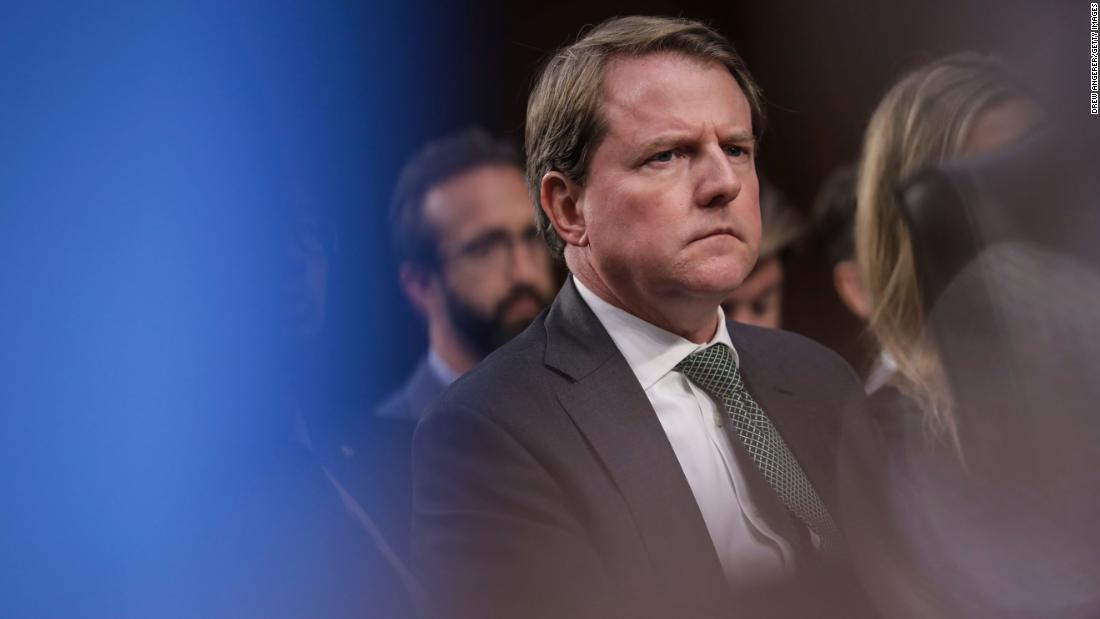
Democrats had sought to put McGahn on record before the House Judiciary Committee on some of the most pivotal moments of the Trump presidency, including when then-President Donald Trump directed McGahn to fire then-special counsel Robert Mueller and McGahn refused.
He had described Trump’s maneuvers extensively to the Mueller team, but the Trump administration had blocked him from repeating the interviews with Congress.
Though Democrats said they were pleased with the substance of the interview, McGahn’s retelling of his interactions largely reaffirmed Mueller’s final, public report, according to a source close to him, and the questioning was limited to topics documented in the Mueller investigation. McGahn was interviewed by both Democrats and Republicans on the Judiciary Committee in alternating rounds.
McGahn served as the top lawyer on Trump’s 2016 campaign and was White House counsel until fall 2018. He was one of the most significant witnesses against Trump, sitting for interviews with the FBI and prosecutors five times in Mueller’s investigation as the special counsel sought to chronicle Trump’s obstructive acts.
The Mueller report found that McGahn refused to follow the President’s directions to fire Mueller “deciding that he would resign rather than trigger what he regarded as a potential Saturday Night Massacre,” referring to one of the darkest periods of the Nixon presidency during the Watergate scandal. Trump also told McGahn to deny he had tried to fire Mueller, but the lawyer wouldn’t do it, according to the special counsel’s report. Trump has denied the episodes with McGahn — but the interview with Congress has allowed McGahn to again put on record — under threat of criminal penalty if he were to lie — that Trump pushed to shut down the Mueller investigation.
McGahn was also privy to the situation that led to Trump firing then-national security adviser Michael Flynn, who lied to the FBI about his contact with Russia in late 2016, Mueller wrote.
Democrats sought McGahn’s testimony shortly after Mueller’s investigation ended in spring 2019. After a lengthy court battle — and stonewalling from the Trump administration — they finally struck an agreement with the Biden Justice Department this spring that allowed for McGahn’s appearance last week.
McGahn had been represented in the standoff in court by administration attorneys claiming he was immune from congressional testimony because of his high-ranking position in the White House. William Burck, a private attorney for McGahn, represented him during his interview.
The Mueller report did not conclude that the President committed a crime like obstruction of justice, but it also made clear that it did not exonerate him, leaving the decision of whether to indict Trump to then-Attorney General William Barr and the Justice Department’s top political appointees. They declined to prosecute the President.
Under the agreement for McGahn’s testimony, House Judiciary Committee members and staff could ask him about the incidents documented in the Mueller report but unable to press McGahn on other scandals that occurred during Trump’s presidency.
McGahn’s private attorney stepped in to stop an answer only a few times Friday, according to the person connected to McGahn, because the committee was potentially veering toward privileged conversations between McGahn and his lawyer. The Justice Department was vocal on some aspects of what McGahn couldn’t answer, the person said, though that wouldn’t be unusual for hearings like these.



